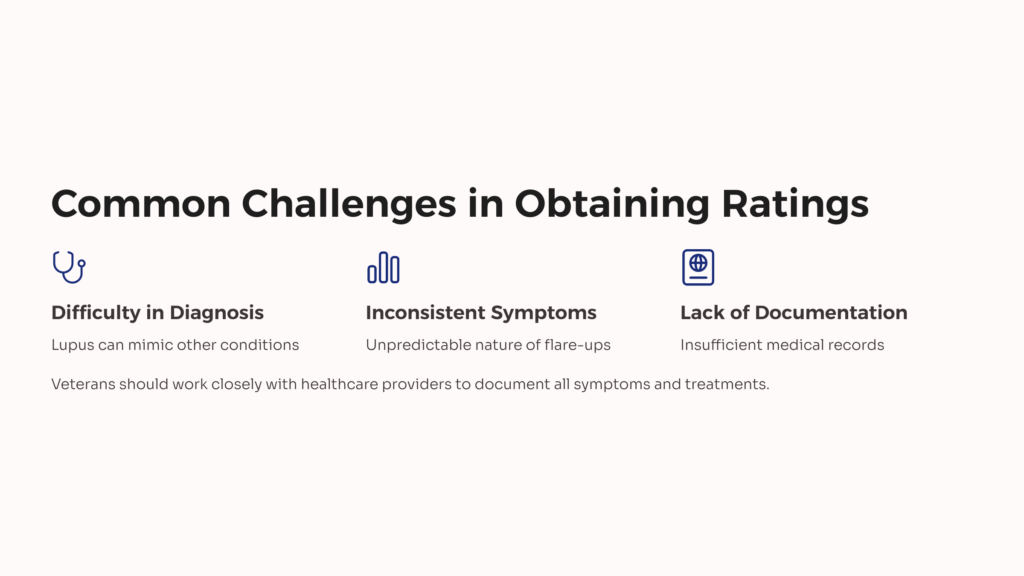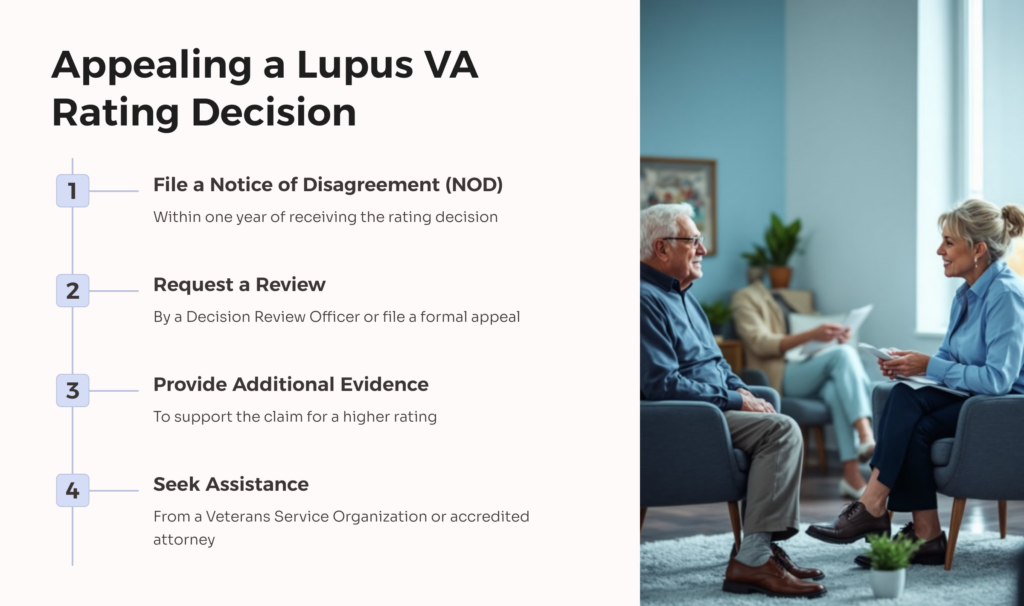Lupus is a complex autoimmune disease that can affect various parts of the body. For veterans who have developed lupus due to their military service, the Department of Veterans Affairs (VA) offers disability compensation. The VA rating for lupus determines the level of benefits a veteran can receive. This rating system is designed to reflect the severity of the condition and its impact on daily life.
Veterans with lupus may experience a wide range of symptoms, from mild to severe. These can include joint pain, skin rashes, fatigue, and organ damage. The VA takes all these factors into account when assigning a disability rating. Understanding how the VA rates lupus is crucial for veterans seeking the benefits they deserve.
It’s important to note that lupus can be challenging to diagnose and rate due to its varied symptoms and unpredictable nature. The VA uses specific criteria to evaluate lupus and determine the appropriate disability rating.
How the VA Rates Lupus

The VA rates lupus under the 38 Code of Federal Regulations (CFR) § 4.88b, Diagnostic Code 6350. This code provides guidelines for rating systemic lupus erythematosus (SLE) based on the frequency of exacerbations and the systems affected by the disease.
The VA uses a percentage-based system to rate disabilities. For lupus, the ratings can range from 0% to 100%, depending on the severity and frequency of symptoms. Here’s a breakdown of the rating criteria:
- 100%: Acute manifestations with frequent exacerbations, producing severe impairment of health
- 60%: Exacerbations lasting a week or more, 2 or 3 times per year
- 10%: Exacerbations once or twice a year or symptomatic during the past 2 years
The VA also considers whether the condition is active or in remission. An active case of lupus with frequent flare-ups will typically receive a higher rating than one that is well-controlled or in remission.
Factors Considered in Lupus VA Ratings
When determining a lupus VA rating, several factors are taken into account. These include:
- Frequency of exacerbations: How often does the veteran experience flare-ups of lupus symptoms?
- Duration of exacerbations: How long do these flare-ups typically last?
- Severity of symptoms: What is the impact of lupus on the veteran’s overall health and daily functioning?
- Affected body systems: Which organs or body systems are impacted by lupus?
- Treatment requirements: What medications or therapies are needed to manage the condition?
- Work capacity: How does lupus affect the veteran’s ability to maintain employment?
The VA will review medical records, lab results, and statements from healthcare providers to assess these factors. It’s crucial for veterans to provide comprehensive documentation of their lupus symptoms and how they affect daily life.
Common Challenges in Obtaining a Lupus VA Rating

Veterans often face challenges when seeking a VA rating for lupus. Some common issues include:
- Difficulty in diagnosis: Lupus can mimic other conditions, making it hard to get a definitive diagnosis.
- Inconsistent symptoms: The unpredictable nature of lupus flare-ups can make it challenging to demonstrate the condition’s severity.
- Lack of documentation: Insufficient medical records or incomplete documentation of symptoms can hinder the rating process.
- Misunderstanding of the condition: Some VA raters may not fully understand the complexities of lupus and its various manifestations.
To overcome these challenges, veterans should work closely with their healthcare providers to document all symptoms and treatments. Keeping a detailed symptom journal can also be helpful in demonstrating the frequency and severity of lupus flare-ups.
Appealing a Lupus VA Rating Decision

If a veteran disagrees with their assigned lupus VA rating, they have the right to appeal the decision. The appeals process involves several steps:
- File a Notice of Disagreement (NOD) within one year of receiving the rating decision.
- Request a review by a Decision Review Officer (DRO) or file a formal appeal to the Board of Veterans’ Appeals.
- Provide additional evidence to support the claim for a higher rating.
- Consider seeking assistance from a Veterans Service Organization (VSO) or an accredited attorney specializing in VA claims.
During the appeal process, it’s essential to gather any new medical evidence that supports the claim for a higher rating. This may include updated medical records, statements from healthcare providers, or additional diagnostic tests.
Secondary Conditions and Lupus VA Ratings
Lupus can lead to various secondary conditions that may qualify for additional VA disability ratings. Some common secondary conditions associated with lupus include:
- Kidney disease
- Heart conditions
- Mental health issues (e.g., depression or anxiety)
- Skin disorders
- Neurological problems
Veterans should ensure that all secondary conditions are documented and included in their VA claim. Each secondary condition can potentially increase the overall disability rating and, consequently, the level of compensation received.
Tips for Maximizing Your Lupus VA Rating

To maximize your chances of receiving an appropriate VA rating for lupus, consider the following tips:
- Keep detailed records of all lupus symptoms, flare-ups, and their impact on daily activities.
- Attend all scheduled VA medical examinations and be thorough in describing your symptoms.
- Obtain statements from family members, friends, or co-workers who can attest to how lupus affects your daily life.
- Work with your healthcare providers to ensure all aspects of your lupus are well-documented in your medical records.
- Consider seeking a second opinion or specialized evaluation if you believe your condition is not adequately represented in your current medical records.
- Stay informed about VA regulations and rating criteria for lupus to ensure you understand how your condition is being evaluated.
By following these tips and providing comprehensive evidence of your lupus symptoms and their impact, you can improve your chances of receiving an accurate and fair VA disability rating.
Resources for Veterans with Lupus
Several resources are available to help veterans navigate the VA rating process for lupus:
- Lupus Foundation of America: Offers information and support for individuals with lupus, including veterans.
- Veterans Service Organizations (VSOs): Provide free assistance with VA claims and appeals.
- VA.gov: The official website of the Department of Veterans Affairs, offering information on benefits and services.
- Local VA Medical Centers: Can provide medical care and documentation needed for lupus claims.
These resources can offer valuable guidance and support throughout the VA rating process, helping veterans with lupus access the benefits they’ve earned through their service.
Final Thoughts on Lupus VA Ratings
Navigating the VA rating system for lupus can be complex, but understanding the process is crucial for veterans seeking appropriate compensation. By documenting symptoms thoroughly, working closely with healthcare providers, and staying informed about VA regulations, veterans can improve their chances of receiving a fair and accurate rating for their lupus.
Remember that the VA rating system is designed to reflect the impact of lupus on a veteran’s life and health. If you believe your rating doesn’t accurately represent your condition, don’t hesitate to seek a review or appeal. With persistence and proper documentation, veterans with lupus can work towards receiving the benefits they deserve for their service-connected condition.
Jumpstart your benefits journey today by taking our free medical evidence screening at AllVeteran.com. We’re here to help!
 AllVeteran.com Advisors
AllVeteran.com Advisors
With expertise spanning local, state, and federal benefit programs, our team is dedicated to guiding individuals towards the perfect program tailored to their unique circumstances.


















